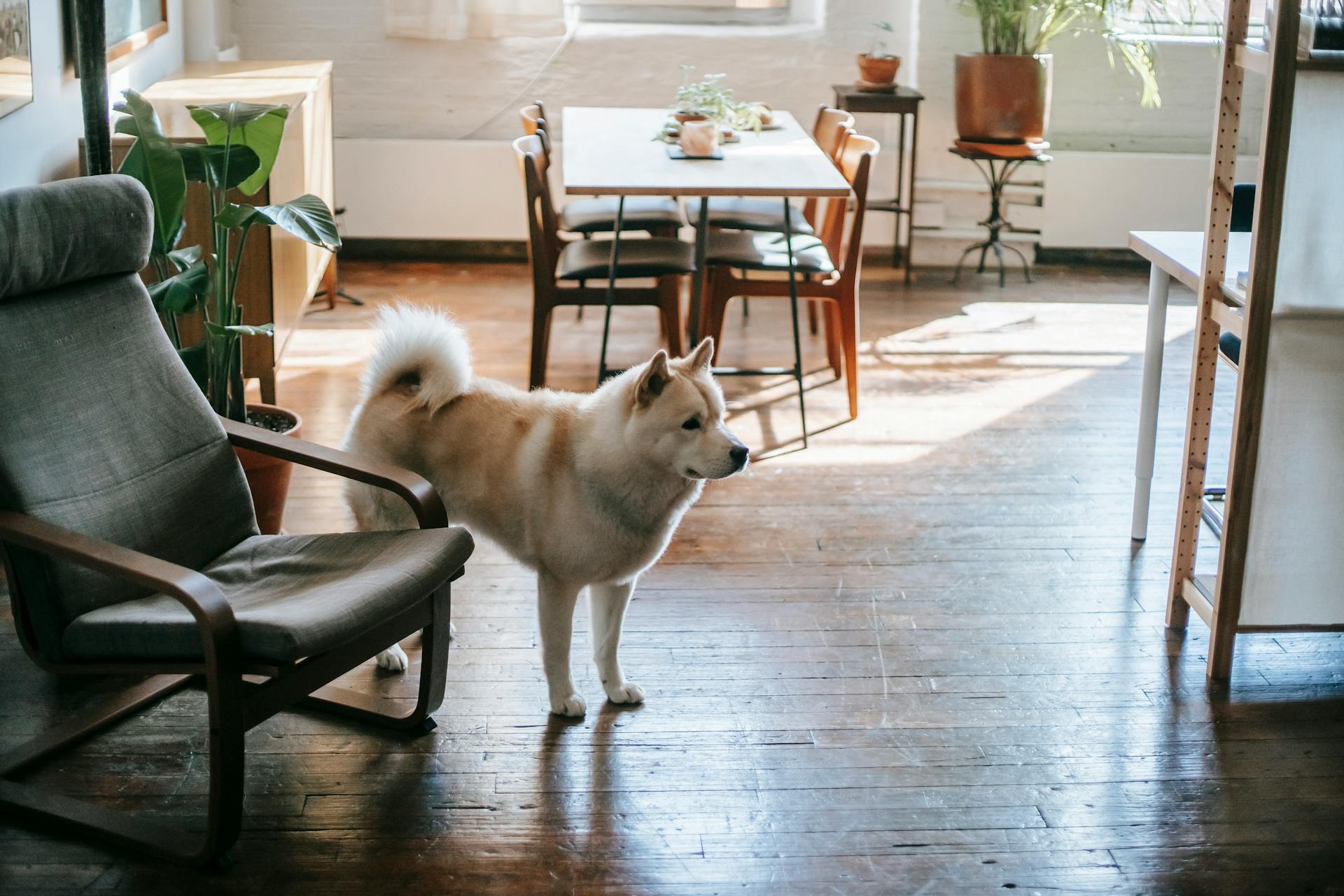
Akita dogs are a popular breed known for their loyalty and protective nature.
Their origins date back to ancient Japan, where they were bred as hunting companions and guard dogs. They were highly valued for their strength, agility, and keen sense of smell.
In terms of size, Akitas typically weigh between 70-130 pounds and stand around 24-28 inches tall at the shoulder. This makes them a large breed that requires regular exercise to stay healthy.
Akitas are also known for their distinctive coat, which is thick and double-layered. They shed heavily twice a year, so owners need to be prepared for regular grooming sessions.
Consider reading: Akitas Good Service Dogs
Physical Characteristics
The Akita is a large and powerful dog breed, with males weighing around 110 pounds and females about 80 pounds.
Their bodies are muscular and slightly longer than they're tall, with straight and strong legs. Akitas have broad chests and necks, as well as large heads with short muzzles and small eyes.
The Akita's coat is short to medium in length and quite dense, making them well-suited for colder climates. They have a thick and soft undercoat that becomes thin during warm months, allowing them to survive in warmer climates as well.
Here are the different colors of the Akita breed:
- Black
- Fawn
- White
- Red
- Brown
- Brown Brindle
- Red Brindle
- Fawn Brindle
- Black, Brown Undercoat
- Black, Silver Undercoat
- Black, Red Undercoat
- Black, Fawn Undercoat
- Brown, Black Overlay
- Fawn, Black Overlay
- Red, Black Overlay
- Silver, Black Overlay
- White, Red Shading
- Silver
- Black Brindle
- Silver Brindle
Some Akitas have a distinctive mask on their face, highlighting their intelligent eyes.
Coat Type
The Akita coat type is quite versatile, varying from short to medium in length.
This unique adaptability makes the Akita a perfect choice for colder climates, where its thick and soft coat can keep it warm. The coat becomes thin during warm months, so this dog can also thrive in warmer climates without any issues.
Weight
The Akita is a large breed of dogs. They originated from the mountainous regions of Japan.
These mighty dogs are known for their strength and size. Males typically weigh between 70 to 130 pounds.
Females, on the other hand, tend to be slightly smaller, weighing between 70 to 100 pounds.
Characteristics Of The
The Akita is a breed that can be quite affectionate with its family members, but it's essential to remember that they best suit an experienced dog parent and a home without young children or other dogs.
Their tendency for "mouthing" means you'll often find them carrying things in their mouths. This behavior can be a bit challenging to get used to, especially if you're not prepared.
Akitas are known to be stubborn at times, which can make training a bit more difficult than with some other breeds. However, they're also good watchdogs who will bark to alert you if something is amiss.
Here's a quick rundown of the Akita's characteristics:
Their loyalty and steadfastness make them a wonderful companion for life, especially if you have a small household.
They Enjoy Cold Weather
Akita owners will be delighted to know that these dogs thrive in chilly temperatures. Their double coat ensures they stay warm, and when things start to cool down, you'll find these dogs have even more energy than usual.
This means that if you like getting out in the cold for some crispy, fresh air, the Akita is your perfect companion. They Really Enjoy the Cold
Temperament and Personality
Akitas are generally reserved dogs, but they can be very affectionate and loyal to their owners.
Typically, 77.80% of Akitas passed a temperament test, which measures stability, shyness, and protectiveness towards owners. They tend to form close bonds with their handlers or owners.
These dogs were never bred to work or live in groups, so they're usually happiest as single household pets. Owners should be cautious about canine interactions, as Akitas may be aggressive toward other dogs, especially those of the same sex.
For more insights, see: Shiba Inu with Owner
Protective Nature
Akitas are known for their protective nature and strong bond with their owners.
They can develop a very strong bond with their pet parents in a short time due to their loyal temperament. According to some sources, Akitas passed the stability test at a rate of 77.80%, which is impressive.
Their protective instinct makes them one of the perfect choices for watchdogs and guards. They tend to be fiercely independent and can develop a possessive attitude towards what they think belongs to them.
You might enjoy: Dog Names for Strong Dogs
Akitas may not always get along with other dogs, especially those of the same sex, so it's essential to socialize them properly from an early age. With proper training and socialization, they can learn to tolerate other animals.
Their loyalty is one of their most notable traits, but it also means they're not always open to playing or sharing with others. This makes them a great fit for households where only one person will be interacting with them regularly.
Barking Level
The Akita breed is known for its loyal and affectionate personality.
Akitas are relatively quiet dogs, but they do have an instinctual side that can make them vocalize quite frequently. They may bark in certain situations, which can be attributed to their natural hunting instincts.
In fact, Akitas are often seen to howl, showcasing another aspect of their expressive nature. Their barking level is not typically high-pitched or persistent, but rather a gentle and occasional expression of themselves.
Additional reading: Are Akitas Good Guard Dogs
Versatile
The Akita is a breed that can thrive in various roles. They make great emotional support dogs, providing comfort and companionship to those who need it.
In addition to their emotional support capabilities, Akitas have also been found in athletic competitions. This versatility suggests that with proper training and socialization, Akitas can adapt to different environments and situations.
Their ability to excel in these diverse settings is a testament to the breed's potential when handled correctly.
Related reading: Are Esa Dogs Service Dogs
Playfulness Level
The Akita is a breed that retains its love for play into adulthood.
They can be very good with kids and enjoy activities like fetch, but their independent nature means they may also be reserved and aloof towards strangers.
Despite their dignified demeanor, Akitas are still playful dogs that thrive on engaging in fun activities.
Training and Care
The Akita breed is a powerful one, so positive reward training is essential in order to foster a trusting relationship between you and your dog.
To train an Akita effectively, use consistent commands for teaching them particular behaviors - using the same command word with each repetition will help ensure that your Akita understands what behavior is expected each time the command is given.
Providing mental stimulation on a daily basis can help keep them focused and occupied to avoid boredom-related activities like destructive chewing or excessive barking.
Clean
Akitas are known for their self-grooming habits and have very little doggy odor compared to other breeds.
This means you can expect a relatively clean living space with an Akita around, which is definitely a plus for many dog owners! They're conscious of cleanliness and take care of themselves, so you don't have to worry about constant messes or odors.
Experienced with Children
The Akita is a friendly and affectionate breed that can be patient with children. However, like any other large dog breed, Akitas should always be supervised around young kids or those who may not have had much contact with canines before.

They will make an amazing companion for any family if the right upbringing and socialization from an early age are provided. This includes meeting all family members beforehand and having plenty of prior experience with other dog breeds.
Here are some key points to consider:
- Akitas should be supervised around young kids or those who may not have had much contact with canines before.
- They will form a strong bond with just one person, which is something to keep in mind for families.
With proper care and attention, Akitas can thrive as family pets. But it's essential to remember that they're not the ideal breed for every family due to their temperamental nature.
Adaptability Level
Akitas are known for their patience and adaptability to change, making them a great fit for many households.
Their ability to handle unpredictable changes in environments is impressive - they can easily adjust to noise levels, weather, daily schedule, and living conditions without breaking a sweat.
This adaptability level makes Akitas a great companion for families who have varying schedules or live in areas with changing weather patterns.
Pet Care
Akita dogs are powerful and dominant breeds that don't welcome strangers, but they're extremely loyal to their owners.
To keep your Akita physically healthy and mentally sharp, it's essential to provide regular water breaks throughout the day and at least one walk per day. You should also feed them high-quality dry food and add in some wet food for variety.
Akitas have a thick double coat that sheds only twice a year, but during this time, you should brush them regularly to prevent matting and ensure their hair doesn't become tangled. Brushing is especially important during shedding season when their undercoat needs extra attention.
The Akita breed was almost extinct in Japan after WWII due to food shortages and the government's order to kill all Akita dogs for fur used in military uniforms. Fortunately, American soldiers brought back Akita puppies from the US, giving the breed a new lease on life.
It's recommended to bathe your Akita once every few months with either a medicated or hypoallergenic shampoo, as frequent bathing can strip their coat of important oils.
Training
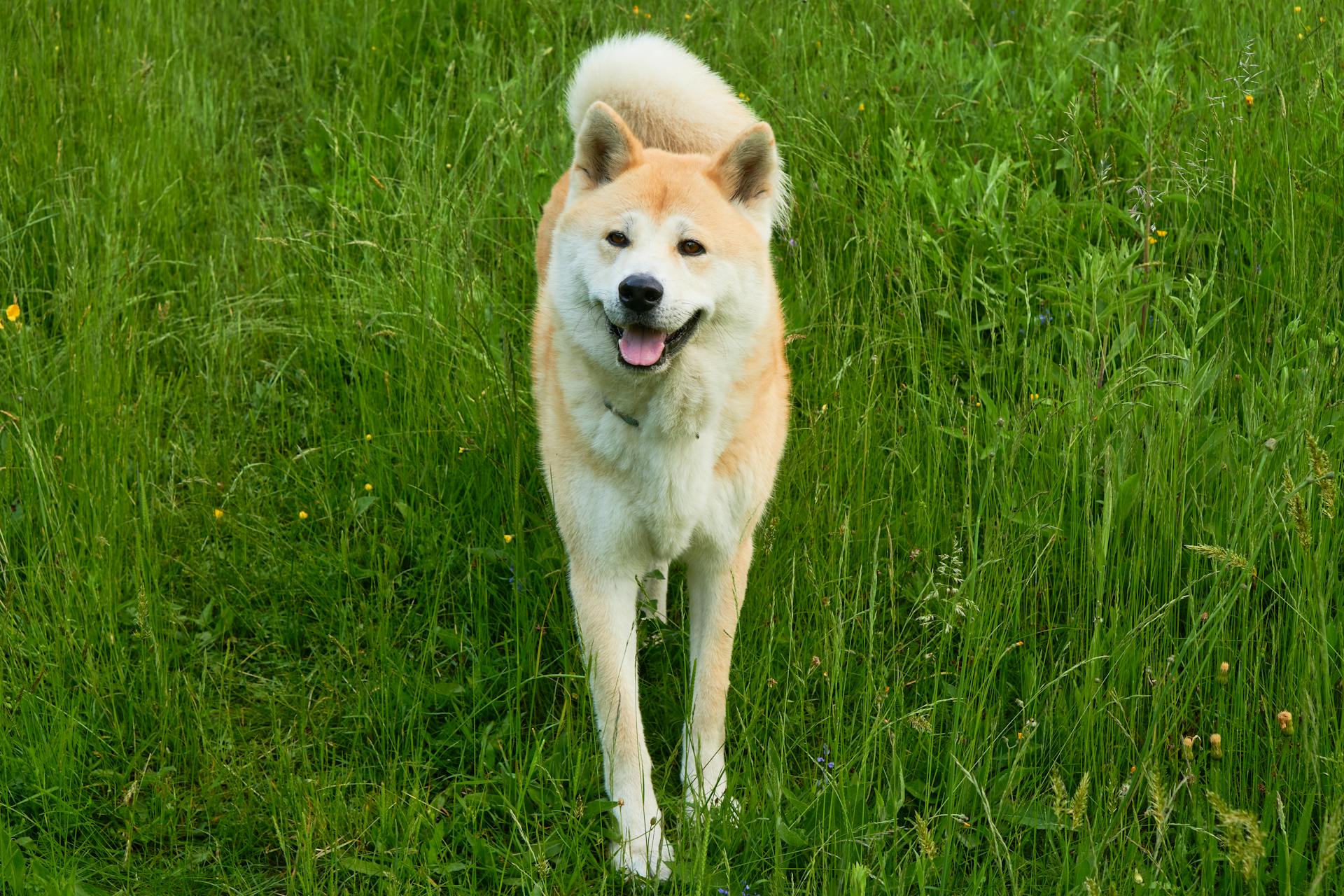
Training is a vital part of an Akita's life, and it's essential to start early.
Akitas are intelligent dogs that thrive on mental stimulation, so providing daily activities can help keep them focused and occupied, avoiding boredom-related issues like destructive chewing or excessive barking.
Consistent commands are crucial when teaching your Akita particular behaviors, as using the same command word with each repetition will ensure they understand what behavior is expected.
Akitas require moderate exercise, a brisk walk or jog once a day should be enough to keep them in good shape, but they also enjoy playing and tend to love water.
Early socialization is vital for Akitas to learn not to perceive strangers as a threat, so it's essential to expose your pet to various environments and people from an early age.
Exercise
Exercise is a crucial part of an Akita's life, and they require consistent physical activity to stay happy and healthy.
Akitas are generally not highly active, so a brisk walk or jog once a day should be enough to keep them in good shape. They also enjoy playing and tend to love water, so many members of the breed enjoy an occasional swim.
To prevent boredom, it's essential to challenge your Akita with various activities and give them jobs to do. This will help stimulate their mind and body, making exercise a fun experience for both you and your pet.
Akitas are powerful dogs that require plenty of exercise, so be prepared to engage in regular physical activity with your furry friend. They can easily become bored if the same routine is repeated daily, so mix things up and try new activities together.
Their thick coat means Akitas don't like hot weather, so it's crucial to monitor their temperature and adjust exercise accordingly. Avoid exercising them during peak sun hours or when the air is humid, as this can cause overheating.
By providing your Akita with regular exercise and mental stimulation, you'll be rewarded with a happy, healthy, and well-behaved companion that will bring joy to your life.
Recommended read: Shiba Inu 1 Dollar
Cons
Akitas can be stubborn and difficult to train, making consistent training a challenge.
This trait requires patience and persistence from owners who are willing to invest time and effort into teaching their Akitas good behavior.
Shedding is another issue that many Akita owners face. They shed profusely, which means you'll need to plan for regular grooming sessions to prevent hair from getting everywhere.
Akitas can also be aggressive toward other dogs, especially if they're not socialized properly from an early age.
This is why it's essential to expose your Akita to various environments and introduce them to different breeds of dogs to help them develop good social skills.
Additionally, Akitas have a high prey drive, which means they'll chase small animals like cats, rabbits, or squirrels if given the chance.
Health and Nutrition
Akita puppies grow rapidly and need a high-quality, low-calorie diet to prevent them from growing too fast.
Adult Akitas should be fed twice a day with a total of 3 to 5 cups of dry food. This can vary depending on their size, with smaller ones needing around 4 cups daily and larger ones requiring up to 5.75 cups.
Nutrition
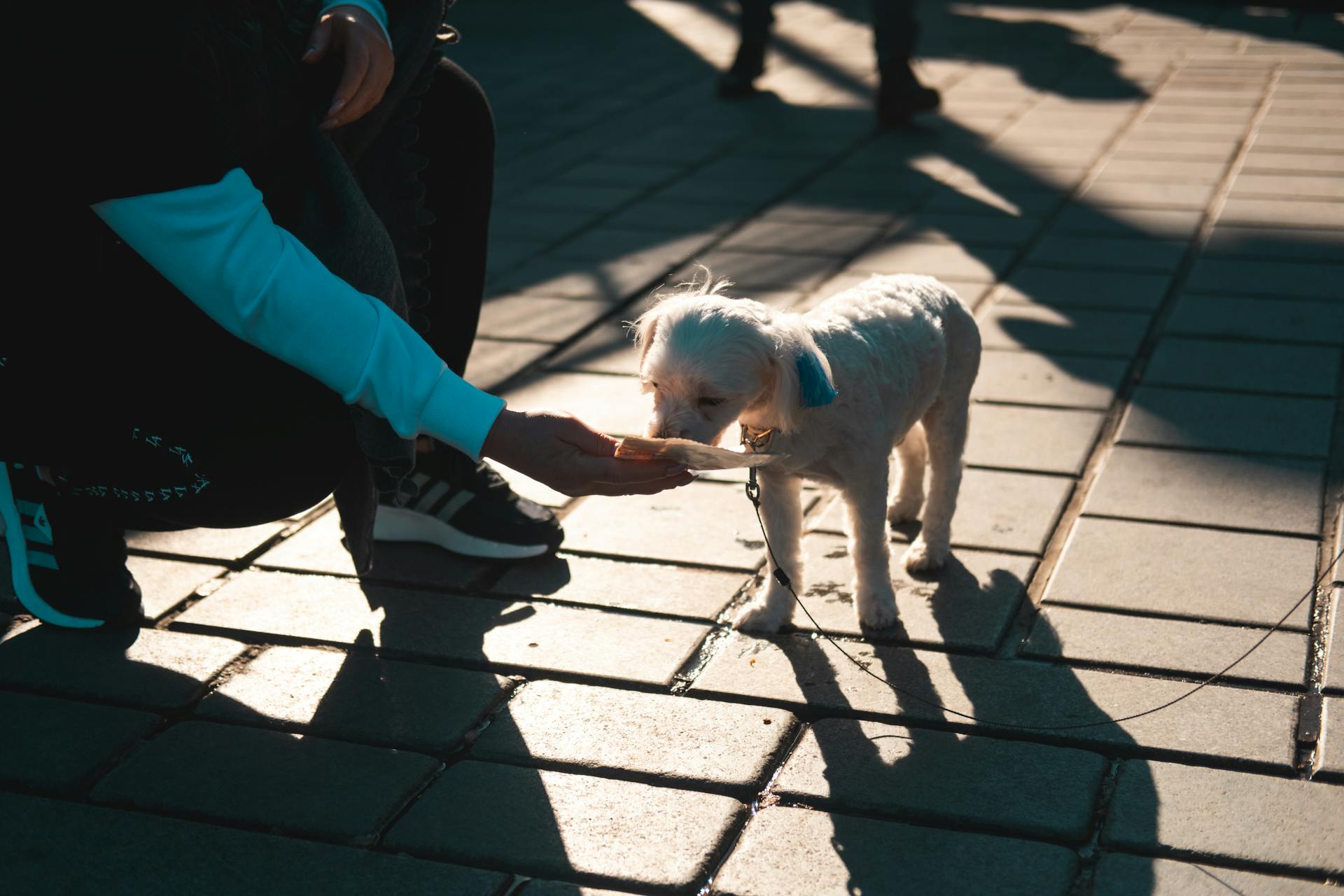
The Akita is a large breed that requires a significant amount of food to maintain its size and energy level.
Akitas are prone to obesity if overfed, so it's essential to monitor their food intake and adjust as needed. They should be fed high-quality dog food that meets their nutritional needs, with an emphasis on protein-rich ingredients.
Akitas have thick coats that require regular grooming, but this doesn't necessarily translate to higher energy needs. However, they do need a balanced diet that includes essential nutrients for coat health, such as omega-3 fatty acids and vitamins A and E.
In terms of feeding frequency, Akitas are best fed 2-3 times a day, with meals spaced out to prevent overeating. This can help maintain their ideal weight and support overall health.
As Akitas age, they may require more frequent vet check-ups to monitor their joint health and adjust their diet accordingly.
See what others are reading: Shiba Inu Exercise Needs
Drooling Level
The Akita is an ancient Japanese breed that's not known for its slobbery drooling around the house.
This breed has a low tendency to cause messes around the house due to their independent nature and lack of need for constant attention.
Their thick double coat, designed to withstand cold temperatures, doesn't seem to be a contributing factor to excessive drooling either.
Health and Conditions
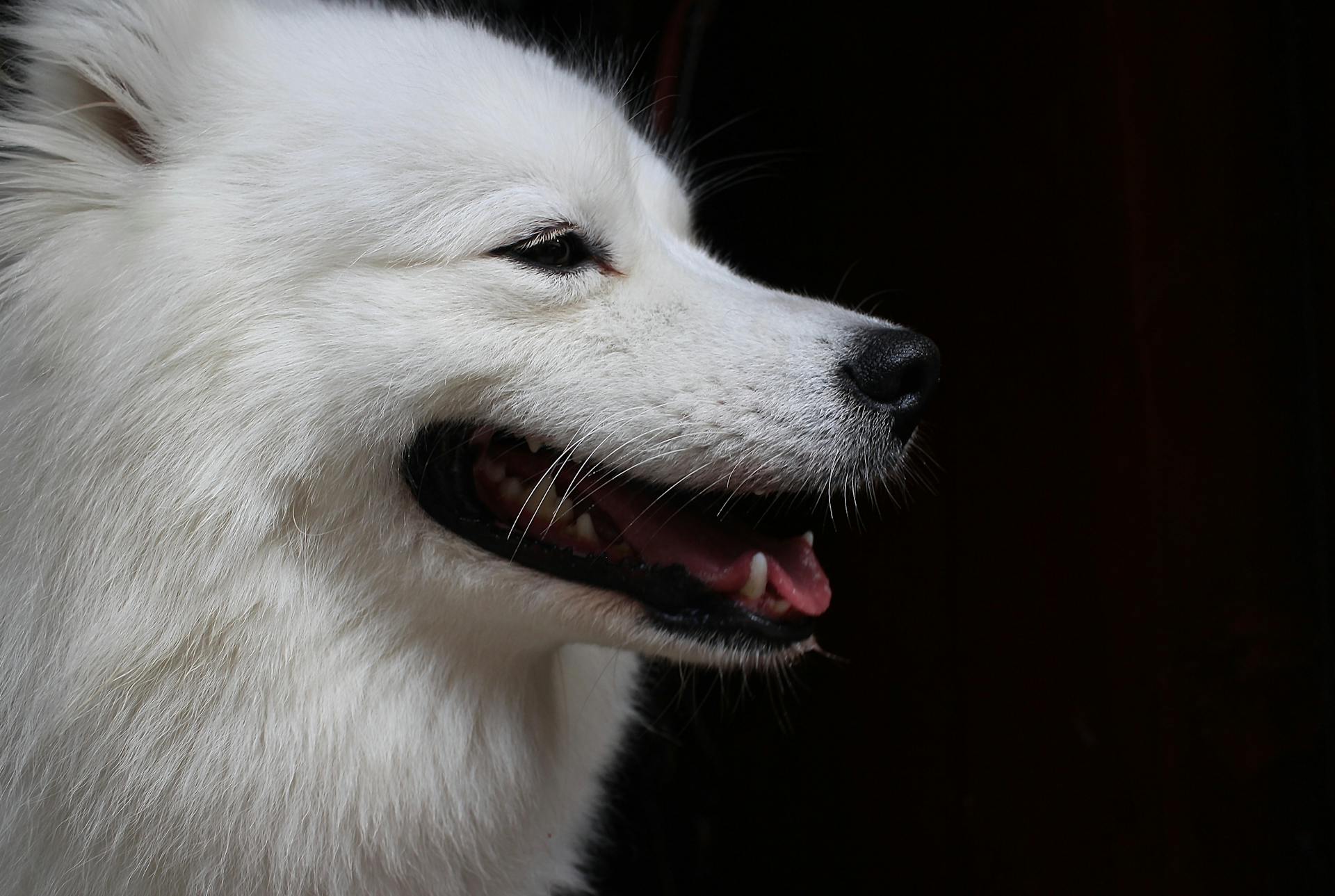
Akitas are generally a healthy breed, but like many purebreds, they can be predisposed to certain medical conditions.
One common issue is hip dysplasia, which occurs when the hip joint doesn't fit together perfectly, eventually leading to arthritis. Regular vet check-ups and maintaining good hygiene practices can help prevent health issues from occurring.
Some Akitas may experience skin infections due to their thick coats, usually caused by flea bites or contact dermatitis. These infections are often preventable with proper care.
Gastric dilatation-volvulus, also known as bloat, is a medical emergency that occurs when dogs eat or drink too quickly, resulting in the production of gas. This can be prevented by feeding your Akita slowly and avoiding exercise after meals.
Akitas may also inherit eye problems such as canine cataracts, multifocal retinal dysplasia, glaucoma, progressive retinal atrophy, entropion, and ectropion. These conditions can lead to blindness if left untreated.
Here are some common health issues in Akitas:
- Hip dysplasia: Improper development of the hip joint that can lead to arthritis.
- Gastric dilatation-volvulus (bloat): A medical emergency caused by gas production when dogs eat or drink too quickly.
- Sebaceous adenitis: An autoimmune skin disease causing hair loss on the head and back.
- Hypothyroidism: An underactive thyroid gland that can be corrected with diet and medication.
- Progressive retinal atrophy (PRA): A inherited eye disease leading to blindness.
Maintaining good hygiene practices, regular vet check-ups, and proper care can help prevent many of these health issues.
Diet Requirements
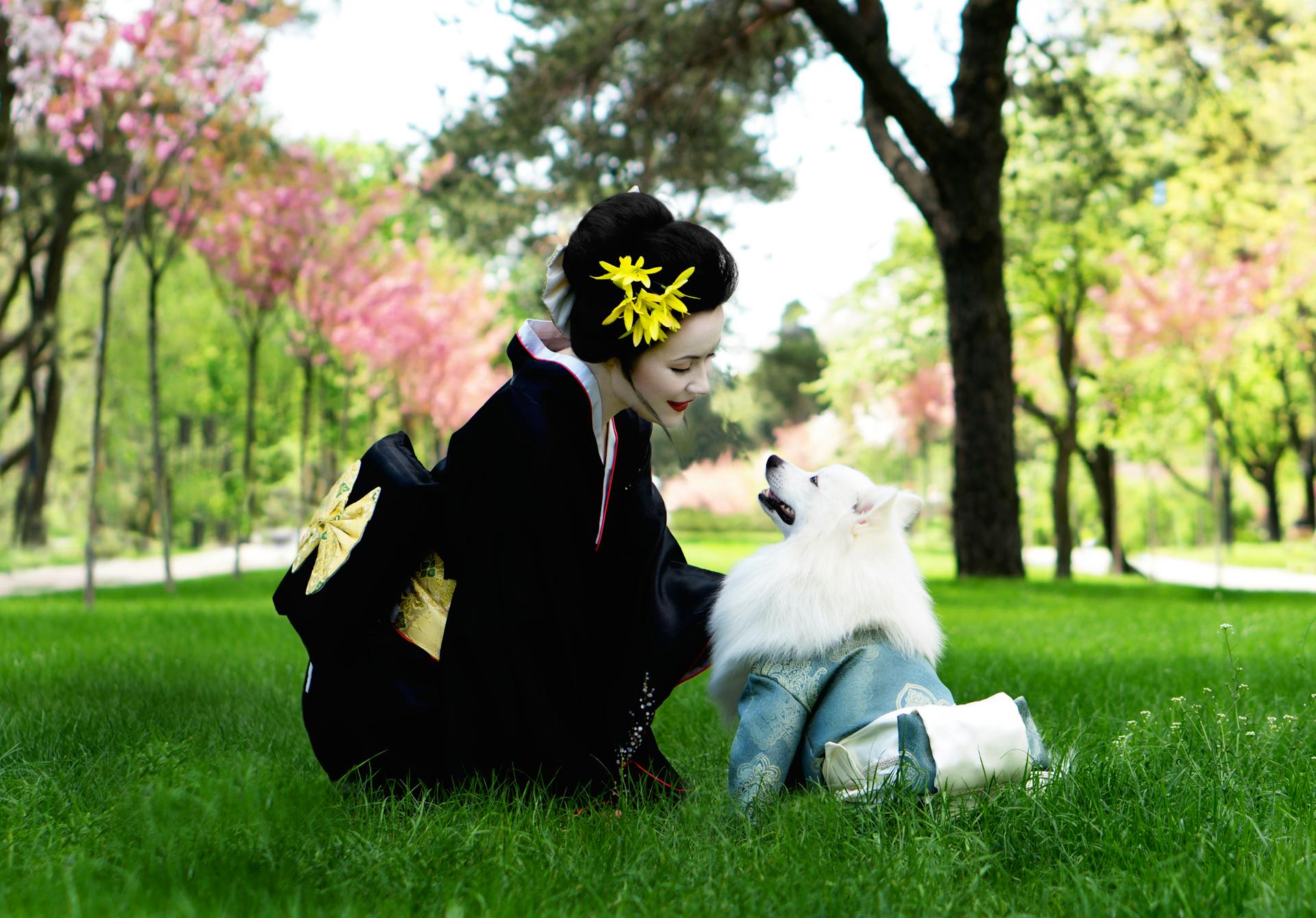
Akita puppies grow rapidly and need a high-quality, low-calorie diet to prevent them from growing too fast.
Adult Akitas should be fed twice a day with a total of 3 to 5 cups of dry food, distributed over two meals. This will help regulate their calorie intake and prevent weight gain.
Smaller Akitas typically need 4 cups of high-quality kibble daily, while larger Akitas require 5.75 cups of kibble daily. It's essential to monitor your Akita's weight gain and discuss any special needs with your veterinarian.
To prevent bloat, ensure your dog doesn't eat too much or too fast, and consider using slow feeders. This will help them digest their food more comfortably and reduce the risk of bloating.
Remember to provide clean, fresh water at all times for your Akita, as they can be prone to getting overweight if not monitored carefully.
Discover more: Shiba Inu Reach 1 Cent
Frequently Asked Questions
Why are Akita dogs expensive?
Akitas are relatively rare and prone to health issues, making them a costly addition to your family. Learn more about these factors and what you can expect when bringing an Akita into your home.
Are Akitas high risk dogs?
Akitas are considered a high-risk breed due to their potential for unprovoked biting incidents. However, with proper training and socialization, they can be loving and gentle companions.
Is an Akita a good family dog?
Generally, Akitas are loyal and affectionate companions for families who value quiet time and close relationships. However, their protective nature may require extra attention and training
Do Akita dogs like to cuddle?
Akitas are known to be affectionate with close family members, often being very cuddly and sweet. However, they may appear aloof at first, reserving their love for those they trust.
Is an Akita close to a wolf?
Akita dogs share a significant amount of DNA with their wild cousins. This genetic connection is reflected in their assertive nature, making them an interesting breed to learn more about.
Featured Images: pexels.com
